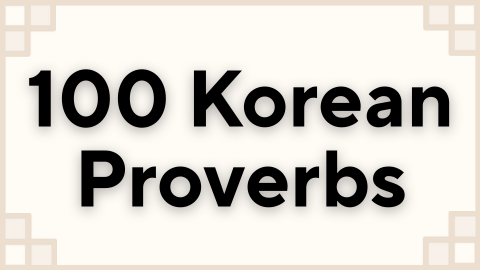Korean Lessons ᚛ Level 2 - Korean for Beginners #1 (Lessons 31 to 60) ᚛ Lesson 48 - To need / not to need in Korean
To need / not to need in Korean
In this chapter, we will learn how to express necessity, need. For this, we will use the following word:
- 필요 = necessity, need
To need something in Korean
To express need of something, we will use the adjective:
- 필요하다 = to be necessary
While we use the form "I need (direct object)" in English, 필요하다 is used with a subject, in exactly the same way as the verb 있다.
That means that we literally construct phrases with the structure "[subject] is necessary", with the help of 필요하다.
We generally use the subject particle 이 / 가 to indicate what we have need of. However, as we saw in the chapter on the subject, the particle 이 / 가 can be left out.
물이 필요해요.
→ I need water.
우리 딸은 핸드폰이 필요해.
→ My daughter needs a phone.
계산기가 필요해.
→ I need a calculator.
도움이 필요합니다.
→ I need help.
To need to do something in Korean
In Korean, the fact of needing to do something is expressed a little differently. For this, we will use the form:
[Stem + modifier -(으)ㄹ] 필요(가) 있다
- If the stem of the verb ends with a vowel: [Stem]ㄹ 필요(가) 있다
- If the stem of the verb ends with a consonant: [Stem]을 필요(가) 있다
In this structure, the particle 가 is generally retained.
저는 잘 필요가 있어요.
→ I need to sleep.
우리는 재활용품을 분리수거할 필요가 있습니다.
→ We need to separate recyclable waste.
우리는 운동할 필요가 있어.
→ We need to exercise.
세계화 시대에 외국어를 배울 필요가 있습니다.
→ In the era of globalization, it is necessary to learn a foreign language.
여행을 자세하게 계획할 필요가 있어요.
→ I need to plan the trip in detail.
우리는 환경 오염의 심각성을 인지할 필요가 있습니다.
→ We need to recognize the seriousness of environmental pollution.
For a past need, the mark of the past in Korean can be placed on the verb or on 있다.
So, the two expressions 할 필요가 있었어요 and 했을 필요가 있어요 are correct.
할 필요가 있었어요.
했을 필요가 있어요.
→ It was necessary to do it.
To not need something in Korean
Learn more
To not need to do something in Korean
Learn more
Summary table of structure
Learn more
Exercises
Learn more
You already know some vocabulary and sentence structures… But when you listen to Koreans speak, do you ever feel like something is missing, the meaning behind the words, the cultural nuance that makes the language truly come alive?
That’s completely normal. In Korean, proverbs and idiomatic expressions are essential to understanding how Koreans think and communicate. Without them, you can speak, but your language will feel flat and overly literal.
With 100 Korean Proverbs - Illustrated and Explained, you’ll understand not only what Koreans say, but why they say it, and what each expression reveals about their mindset and culture.
Learn more

